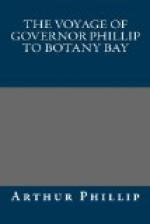Rats are the only quadrupeds which have been found in this island; and from these, as well as from the ants, it was feared the crops might suffer; but no great inconvenience has yet been experienced from them; and proper exertions seldom fail in a short time to reduce the number of such enemies, enough to make their depredations very inconsiderable. On the whole, Norfolk Island certainly deserves to be considered as an acquisition of some importance, and is likely to answer even the most sanguine expectations. Some canoes have been found on the rocks, which were supposed to have been driven from New Zealand; but the appearance of a fresh cocoa nut and a small piece of manufactured wood, which seemed to have been only a small time in the water, has lately suggested an idea that probably some inhabited island may lie at no great distance. There has not been as yet any opportunity to determine whether this opinion be well founded or not.
A small island, but entirely uninhabited, was discovered by Lieutenant Ball in his passage to Norfolk Island. In his return he examined it, and found that the shore abounded with turtle, but there was no good anchorage. He named it Lord Howe Island. It is in 31 deg. 36’ south latitude, and 159 deg. east longitude. Part of this island being very high may be seen at the distance of sixteen leagues, and a rock to the south-east of it, may be discerned even at eighteen leagues. In latitude 29 deg. 25’ south, longitude 159 deg. 59’ east, a very dangerous reef has since been seen. The ship from which it was observed was then four leagues to the southward, and it could not at that time be ascertained how far it extends to the northward.
To expedite the cultivation of Norfolk Island a fresh detachment was sent thither in October, consisting of an officer and eight marines, with thirty convicts, consisting of ten women and twenty men: Thus, there existed on this islet, when the last accounts were transmitted, forty-four men and sixteen women, who, having eighteen months provisions, lived comfortably on this sequestered spot, under the prudent management of a youthful ruler, of whose busy life the reader may wish to know all the particulars, which at present can be authentically told.
Philip Gidley King, who had the honour to conduct the original settlers to Norfolk Island, was born at Launceston in Cornwall, on the 23d of April, 1758. He is the son of Philip King, of that town, draper, who married the daughter of John Gidley, of Exeter, attorney at law. Much as he owes to his parents, he is indebted for his scholastic learning to Mr. Bailey at Yarmouth. He derives, probably, some advantages from making an early choice of his profession. At the age of twelve, he went to the East Indies on board the Swallow frigate, Captain Shirley, by whom he was rated a midshipman. From this station he returned to England, at the end of five years, with much knowledge of his business, and some acquaintance




